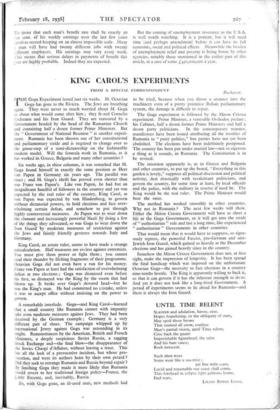• KING CAROL'S EXPERIMENTS
FROM A SPECIAL CORRESPONDENT Bucharest.
THE Goga Experiment lasted just six weeks. M. Octavian Goga has gone to the Riviera. The Jews are breathing again. They were never so much worried about M. Goga as about what would come after him ; they fe ired Corneliu Codreanu and his Iron Guard. They are reassured by a Government headed by the head of the Rumanian Church and containing half a dozen former Prime Ministers. But the "Government of National Reunion" is another experi- ment. Rumania has been thrown out of her constitutional and parliamentary stride and is required to change over to the goose-step of a semi-dictatorship on the fashionable modern model. Will the formula work in Rumania, as it has worked in Greece, Bulgaria and many other countries ?
Six weeks ago, in these columns, it was remarked that M. Goga found himself in exactly the same position as Herr von Papen in Germany six years ago. The parallel was exact; and M. Goga's shrift has proved even shorter than was Franz von Papen's. Like von Papen, he had but an insignificant handful of followers in the country and yet was expected by the real ruler of the country, King Carol, as von Papen was expected by von Hindenbuig, to govern without dictatorial powers, to hold elections and face over- whelming certain defeat, and somehow to put through highly controversial measures. As Papen was .to wear down the clamant and increasingly powerful Nazi4 birdoing a few of the things they advocated, so was Goga to wear down the Iron Guireily moderate measures of restriction against the Jews and faintly friendly gestures towards Italy and Germany.
King Carol, an astute ruler, seems to have made a strange miscalculation. Half measures are useless against extremists. You must give them power or fight them ; you cannot steal their thunder by filching fragments of their programme. Octavian Goga did not even have a run for his money. Franz von Papen at least had the satisfaction of overwhelming defeat at two elections ; Goga was dismissed even before his first, so dismayed was the King by the storm that had blown up. It broke over Goga's devoted head—but he was the King's man. He had committed no mistake, unless it . was to accept office without insisting on the power to govern.
A remarkable interlude. Goga—and King Carol—learned that a small country like Rumania cannot with impunity take even moderate measures against Jews. They had been deceived by the German example ; Germany is a very different pair of shoes. The campaign whipped up by international Jewry against Goga was astounding in its might. Remonstrances by the American, British and French Ministers, a deeply suspicious Soviet Russia, a sagging Stock Exchange and—the final blow—the disappearance of the Soviet Chargé d'Affaires, without leaving a trace. This has all the look of a provocative incident, but whose pro- 7ocation, and were its authors hoist by their own petard ? Did they seek to estrange Rumania and Russia beyond repair ? BY finishing ,Goga they made it more likely, that Rumania would revert to her traditional foreign policy—France, the Little Entente, and, inevitably, Russia.
SO, With'. Go_ ga gone, an ill-used man, new methods had to be tried, because when you throw a spanner into the machinery even of a pretty primitive Balkan parliamentary system, the damage is difficult to repair.
The Goga experiment is followed by the Miron Cristea experiment. Prime Minister, a venerable Orthodox prelate ; his Cabinet, half a dozen former Prime Ministers and half a dozen party politicians. In the contemporary manner, manifestoes have been issued attributing all the troubles of Rumania to "party politics," but parties have not yet been abolished. The elections have been indefinitely postponed. The country has been put under martial law—not so rigorous a thing as it sounds, in Rumania. The Constitution is to be revised.
The intention apparently is, as in Greece and Bulgaria and other countries, to put up the board, "Everything in this garden is lovely," suppress all political discussion and political activity, deal drastically with recalcitrant politicians, and govern the country, for some time at least, by local officials and the police, with the military in reserve if need be. The King would be the real ruler. The Prime Minister would bear the onus.
The method has worked smoothly in other countries. Why not in Rumania ? The next few weeks will Shoiv. Either the Mfr on Cristea Government will have as short a life as the Goga Government, or will get into the stride of" authoritarian" rule and last a long time, like experienced " authoritarian " Governments in other countries.
That would mean that it would have to suppress, or rigor- ously repress, the powerful Fascist, pro-German and anti- Jewish Iron Guard, which gained so heavily at the December elections and has gained heavily since in the country.
Somehow the Miron Cristea Government does not, at first sight, make the impression of longevity. It has been spared the fatal handicap which was imposed on the unfortunate Octavian Goga—the necessity to face elections in a country nine-tenths hostile. The King is apparently willing to back it, so that it can govern if it has the inherent strength to do so. And yet it does not look like a long-lived Government. A period Of experiments seems to lie ahead for Rumania—and there is always the Iron Guard.










































 Previous page
Previous page